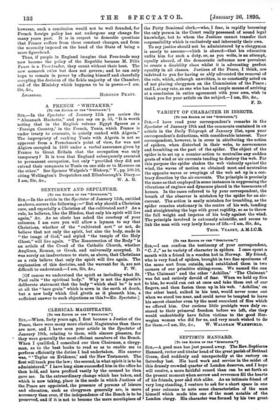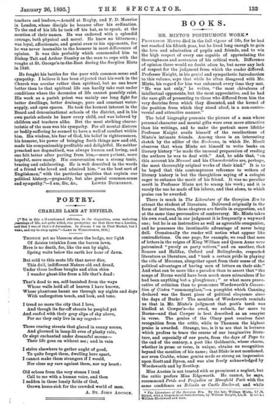SEPTIMUS HANSARD.
[To THE EDITOR OF THE "SPECTATOR.'?
Sin,—A good man has just passed away. The Rev. Septimns Hansard, rector and titular head of the great parish of Bethnal Green, died suddenly and unexpectedly at the rectory on Saturday last. His hard work and service in the midst of this densely crowded quarter of London deserves, and I hope will receive, a more faithful record than can be set forth at. the present moment when sorrow and reverence fill the hearts of his friends, poor and rich alike. As an intimate friend of very long standing, I venture to ask for a short space in one of your columns to note some characteristics of the man himself which made him one of the most notable of the London clergy. His character was formed by his two great teachers and leaders,—Arnold at Rugby, and F. D. Maurice in London, whose disciple he became after his ordination. To the end of his life he took off his hat, so to speak, at the mention of their names. He was endowed with a splendid courage, both physical and moral. He knew no bitterness ; was loyal, affectionate, and genial even to his opponents, for he was never insensible to the humour in most differences of opinion. It was this probably which commended him to Bishop Tait and Arthur Stanley as the man to cope with the roughs at St. George's-in-the-East during the Surplice Riots in 1848.
He fought his battles for the poor with common-sense and sympathy. I believe it has been objected that his work in the Church was secular rather than spiritual, but no one knew better than he that spiritual life can hardly take root under conditions where the decencies of life cannot possibly exist. His work as a parish priest was mainly one long fight for better dwellings, better drainage, pure and .constant water- supply, and open spaces. He took the keenest interest in the Board and denominational schools of the district, and in his own parish schools he knew every child, and was beloved by children and teachers alike. But the most striking charac- teristic of the man was his sympathy. For all mental distress or bodily suffering he seemed to have a well of comfort within him. His wisdom, his fear of God, his belief in righteousness, his humour, his power of bringing forth things new and old, made his companionship profitable and delightful. He neither preached nor dogmatised, was always human and loving, and one felt better after parting from him,—more patient, more hopeful, more manly. His conversation was a strong tonic, bracing and exhilarating. He is well described in the words of a friend who loved and admired him, " as the best sort of Englishman," with the particular qualities that explain our political history,—pugnacity, but also genial common-sense
and sympathy."—I am, Sir, &c., LOWES DICKINSON.



















































 Previous page
Previous page